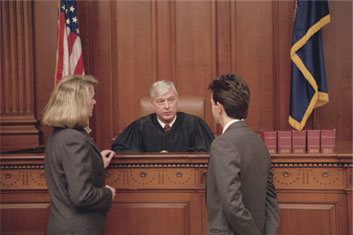

Limited Scope Representation | Divorce and Family Law | Los Angeles | Ventura
We formerly offered Legal Representation in specific areas that you couldn't effectively handle by yourself, while you managed your litigation budget by handling the remaining areas of the case for which you didn't want or need or could not afford legal representation. We no longer offer Limited Scope representation. We can refer you to Limited Scope Attorneys if you need or desire and can afford limited scope representation.
Limited Scope Representation in Specific Areas:
We can refer you to Limited Scope Attorneys to provide you expert Legal Representation in specific areas that you realize that you cannot effectively handle by yourself, while you manage your litigation budget by handling the remaining areas of the case for which you don't want or need or cannot afford representation.We recognize that clients may have financial constraints, so our clients have the option of limited scope representation to make it possible for you to select specific aspects of your divorce that you need expert assistance in, to secure representation to resolve difficult or complex issues.
In Limited Scope Representation, the client and attorney agree in advance which issues will be handled by whom, enabling the client to save legal fees on the work that the client chooses to handle, while receiving the benefit of the attorney's education, training, experience, creativity, knowledge, drive, tenacity, talent and skill in portions of the case which the client is unable to adequately handle, or does not wish to handle.
What is Limited Scope Legal Representation?
You might wonder: What is limited scope legal representation? Limited Scope Representation is where a party and a lawyer agree that the lawyer will handle some parts of the party's case and the party will handle others. This is different from traditional full-service arrangements where the lawyer is retained to provide legal services on all aspects of a case, from start to finish. Limited-scope representation is sometimes called "discrete task representation."
The following are some examples of limited-scope arrangements:
- The party hires the lawyer to represent the party on certain issues in his/her case (such as child support or custody) while the party does the rest.
- The party hires the lawyer to represent the party as the attorney of record only at a certain hearing.
- The party hires the lawyer to represent the party on only a certain hearing date.
- The party hires the lawyer until submission of the order after hearing.
- The party hires the lawyer until resolution of certain issues by trial or settlement.
- The party hires the lawyer for only a specified duration of representation.
Issues for which the party may hire a lawyer as his/her attorney of record could be any, or any combination of:
- Establishing Child Support
- Enforcing Child Support
- Modifying Child Support
- Establishing Spousal Support, enforcing Spousal Support
- Modifying Spousal Support
- Establishing Restraining Orders
- Enforcing Restraining Orders
- Modifying Restraining Orders
- Establishing Child Custody and/or Visitation
- Enforcing Child Custody and/or Visitation
- Modifying Child Custody and/or Visitation
- Division of Property
- Pension Issues
- Contempt
- Preparation and service of formal discovery
- Receipt and review of discovery responses
- Meeting and conferring regarding discovery responses
- Preparation and participation in hearing of Discovery Motions
- Deposing parties or witnesses
- Preparing, Issuing and serving Subpoenas
- and other matters
The Limited Scope attorney can provide Unbundled Services to the Limited Scope client, as well as Limited Scope services, where their written agreement provides for both types of service.
Savings realized via Limited Scope Representation:
Limited-scope representation can be a great way for the party to obtain legal help with the party's case while keeping costs down, when a party cannot afford full-service representation (i.e., for a lawyer to handle all aspects of the party's case). The party pays only for the Limited Scope Legal Services, and handles the balance of the party's case without legal expense. Courts approve of limited-scope representation because they want to encourage people to get as much legal assistance as they need to protect their rights. Courts recognize that the party will do a better job of following proper court procedures and presenting the important information to them if the party has the assistance of a lawyer during the more complicated parts of a case.
Be clear about limited scope representation if you want it:
If you want limited scope representation, when you speak with a lawyer, make sure that you are clear about what you want - that you do not want to hire the lawyer to handle the entire case, but only specified part(s) of the case, and that you will handle the balance of the case.
Deciding if limited-scope representation is right for you:
When trying to decide if a limited-scope arrangement is right for you, you should: . Discuss your case with a lawyer in depth, including areas that you want to handle yourself. If you do not discuss the whole case with the lawyer (even the parts that you think are simple and want to handle yourself), you will not know if you have overlooked something that is legally important. Once you have had this discussion, you and the lawyer can agree on whether a limited-scope arrangement will work for you and your case, and you can be comfortable that you have identified any hidden complications. Decide if you are willing to take on full responsibility for those parts of the case you will handle on your own. Remember that the lawyer went to law school and probably has years of experience in this area. That means that he or she will know things you do not about the legal process.
If you instruct your lawyer not to take certain steps, either to save money or because you want to remain in control, you will have the full responsibility for the outcome in the parts of the case you do yourself, even with a lawyer coaching you.
Get help deciding if limited-scope representation is a good idea for a child support case, child custody case, spousal support case, or a case involving the division of property.
Limited Scope representation vs. Full Service representation:
There are a number of benefits to limited-scope representation over full representation:
By only paying a lawyer to do those parts of your case that you cannot do yourself, you can save money on legal fees. The lawyer can use his or her time more efficiently by focusing that time on things you cannot effectively do yourself and leaving other more time-consuming tasks to you. You can keep greater control of your case than if the lawyer handles the entire case.
But, there are times when Limited Scope may not be a good choice, such as when:
- Your case has a lot of technical issues or is very time-sensitive.
- You do not have the time to put into educating yourself and effectively handling many of the tasks that you need to do.
- There is a lot at stake in your case, so if you lose, you could lose your home, lose pension rights, lose rights to see your children, or owe a lot of money, among other things.
Limited Scope representation vs. representing yourself in Pro Per:
Limited Scope representation can often be a better alternative than representing yourself:
Having a lawyer helping you with parts of your case can save you a lot of time and energy because the lawyer can educate you about the process and your specific issues. He or she can also help you find self-help books and other resources so you can handle the parts of the case when you are on your own.
A lawyer, by being more removed from your case than you are, can objectively see things about your case that you cannot. A lawyer can help you focus on the legal issues and on what the court can do for you, and prevent you from getting distracted by emotions or other issues.
A lawyer can identify potential problems or hidden complications early on, so you can avoid making a costly mistake.
Working with a limited-scope lawyer:
You and the lawyer should have an in-depth discussion about all the aspects of your case, and agree on your respective responsibilities.
Some of the issues you need to work out with the Limited Scope lawyer are:- Who will decide on the strategy?
- Who will gather what information?
- Who will prepare the information for the court?
- Who will draft documents for the court?
- Who will appear at court proceedings and settlement conferences?
- Who will negotiate with the other side?
In making decisions about these issues, remember that the lawyer has the education and experience to work on the more technical parts of your case, guide you throughout the court process, and spot important legal issues that you may not see on your own.
You and the limited-scope lawyer will be working as a team, but it is your case. If you and the lawyer cannot agree on who should take on which parts of the case, or on decisions that need to be made in your case, you should listen to what the lawyer says. If the lawyer feels strongly that the course you want to take is not in your best interests, listen carefully to the reasons why he or she is recommending you do something differently.
But, in the end, it is your case, your decision and your responsibility. You have the right to disregard the lawyer's advice, but if the case does not turn out the way you hoped, you have to be willing to accept the responsibility for your decision.
The lawyer will likely tell you where to look to find tools to help you assist in your own representation. There are many good resources out there, including the California Courts Online Self-Help Center, help from your court, your court's website, your local public law library, and others.
Court forms and contracts in limited-scope cases:
There are special forms that you and your limited-scope lawyer are required to use when you agree to limited-scope representation.
Limited Scope Retainer Agreement:
Make sure your contract with the limited-scope lawyer is very clear, and that every detail you discussed in terms of handling the case is in writing. If anything changes, you can always agree to increase or change the scope of representation between the two of you at a later time. Your contract should be very clear on what the lawyer will and will not be doing, as well as what you, the client, will be doing. The contract should also clearly specify how you will be charged and your fee arrangement. The clearer you are, the more likely you are to avoid any misunderstandings. Before you sign, make sure you understand everything in the agreement and the risks of limited-scope representation.
Court forms:
A special FL-950 Form NOTICE OF LIMITED SCOPE REPRESENTATION has to be signed by the party and attorney, served on the other side and filed with the Court in your Family Law case to inform the court and the other side of the limited-scope representation if the lawyer is going to appear in Court in the case for you.
When the lawyer has finished with the part of the case agreed to, make sure to sign and file the Substitution of Attorney-Civil (Form MC-050).
A Powerful, Efficient, Successful Approach to Family Law and Divorce. E-mail us or Call 818.880.8990 or 888.616.0659 | Free telephone consultation.




